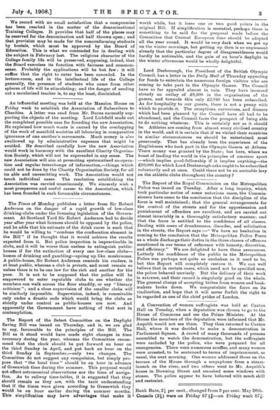The Report of the Select Committee on the Daylight Saving
Bill was issued on Thursday, and is, we are glad to say, favourable to the principles of the Bill. The Bill as it stood would have made eight changes in time necessary during the year, whereas the Committee recom- mend that the clock should be put forward an hour on the third Sunday in April, and put back an hour on the third Sunday in September,—only two changes. The Committee do not suggest any compulsion, but simply pro- pose that "the local time" should be an hour in advance of Greenwich time during the summer. This proposal would not affect astronomical observations nor the time of naviga- tion. As to railway time-tables, it is suggested that they should remain as they are, with the tacit understanding that if the times were given according to Greenwich they would be an hour earlier during the slimmer months, This aimplificAtion may have advantages that maim it worth while, but it loses one or two good points in the original Bill. If simplification is essential, perhaps there is something to be said for the proposal made before the Committee that Central European time should be adopted all the year round. It would be very dark when we got up on the winter mornings, but getting up then is so unpleasant already that the particular degree of disagreeableness would hardly be noticeable, and the gain of an hour's daylight in the winter afternoons would be wholly delightful.


















































 Previous page
Previous page